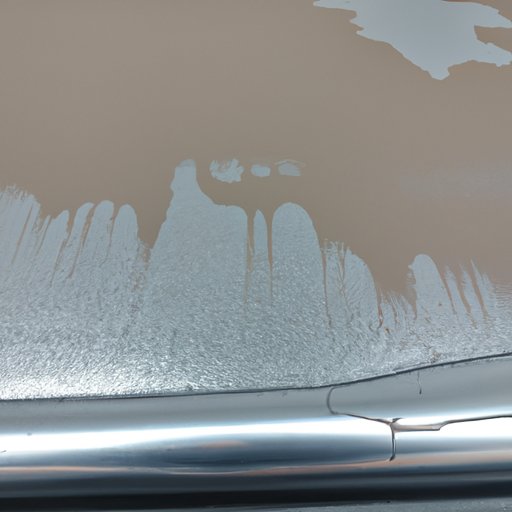Introduction
Aluminum is a popular metal used in a variety of applications, from automobiles to aircraft. As a lightweight and relatively affordable metal, aluminum is an ideal choice for many industries. However, like other metals, aluminum is susceptible to corrosion. In this article, we will explore what aluminum corrosion is, the effects it can have, and how to prevent it.
The Corrosive Properties of Aluminum: Examining the Effects of Exposure
Corrosion is the gradual degradation of materials due to environmental factors. In the case of aluminum, the metal reacts with oxygen in the atmosphere to form a protective oxide layer. This layer is important for preventing further corrosion, but it can be damaged or removed by certain conditions.
When exposed to certain elements, such as water or salt, aluminum can corrode quickly. The rate of corrosion depends on several factors, including temperature, humidity, and type of alloy. Corrosive elements can cause pitting, which is when small holes or pits form in the surface of the metal. Over time, these holes can grow and weaken the structure of the aluminum.
Other forms of corrosion include galvanic corrosion, which occurs when two dissimilar metals are placed in contact with each other; crevice corrosion, which occurs in areas where there is minimal air circulation; and stress corrosion cracking, which happens when the metal is under mechanical stress and exposed to certain chemicals.
An Overview of Corrosion Resistance in Aluminum Alloys
The level of corrosion resistance in aluminum alloys is determined by the type of alloy and its chemical composition. Different alloys have different levels of corrosion resistance, and some are more resistant than others. For example, aluminum-magnesium alloys are more resistant to corrosion than aluminum-zinc alloys.
Corrosion resistance ratings are assigned to aluminum alloys based on their ability to resist corrosion. These ratings range from 0 (no resistance) to 10 (highest resistance). The higher the rating, the better the alloy’s ability to resist corrosion.

How to Protect Aluminum from Corrosion
To protect aluminum from corrosion, various protective coatings and treatments can be applied. Common coatings include paint, powder coating, anodizing, and electroplating. These coatings provide a barrier between the aluminum and the environment, preventing corrosion-causing elements from reaching the metal.
In addition to coatings, proper storage and maintenance practices can help protect aluminum from corrosion. It is important to store aluminum in a dry, well-ventilated area, as moisture and humidity can accelerate corrosion. Regular cleaning and inspection of aluminum surfaces can also help identify potential problems before they become more serious.

Common Causes and Prevention of Aluminum Corrosion
Environmental factors are the most common cause of aluminum corrosion. Acid rain, salt spray, and high temperatures can all contribute to corrosion. Poor maintenance practices, such as inadequate cleaning or insufficient lubrication, can also lead to corrosion.
To prevent aluminum from corroding, it is important to use protective coatings and treatments. Additionally, regular maintenance and storage practices should be followed to ensure that the metal remains in good condition. Finally, if possible, avoid using aluminum in areas where environmental factors may cause corrosion.

Comparing Aluminum Corrosion to Other Metals
When comparing aluminum corrosion to other metals, it is important to consider the advantages and disadvantages of each metal. Aluminum has several advantages, such as being lightweight, corrosion resistant, and relatively inexpensive. However, it is not as strong or durable as other metals, such as steel.
When compared to stainless steel, aluminum is less resistant to corrosion. Stainless steel is much more resistant to corrosion, making it the preferred material for many applications. However, stainless steel is more expensive and heavier than aluminum, so it may not be suitable for certain applications.
Conclusion
Aluminum is a popular metal used in many industries, but it can corrode over time. Corrosion can damage aluminum, weakening its structure and reducing its lifespan. To prevent corrosion, it is important to apply protective coatings and treatments, follow proper storage and maintenance practices, and avoid using aluminum in areas where environmental factors may cause corrosion. Additionally, it is important to compare aluminum to other metals to determine which one is best suited for a particular application.
By understanding the corrosive properties of aluminum and taking the necessary steps to protect it, you can ensure that your aluminum products remain in good condition for years to come.

